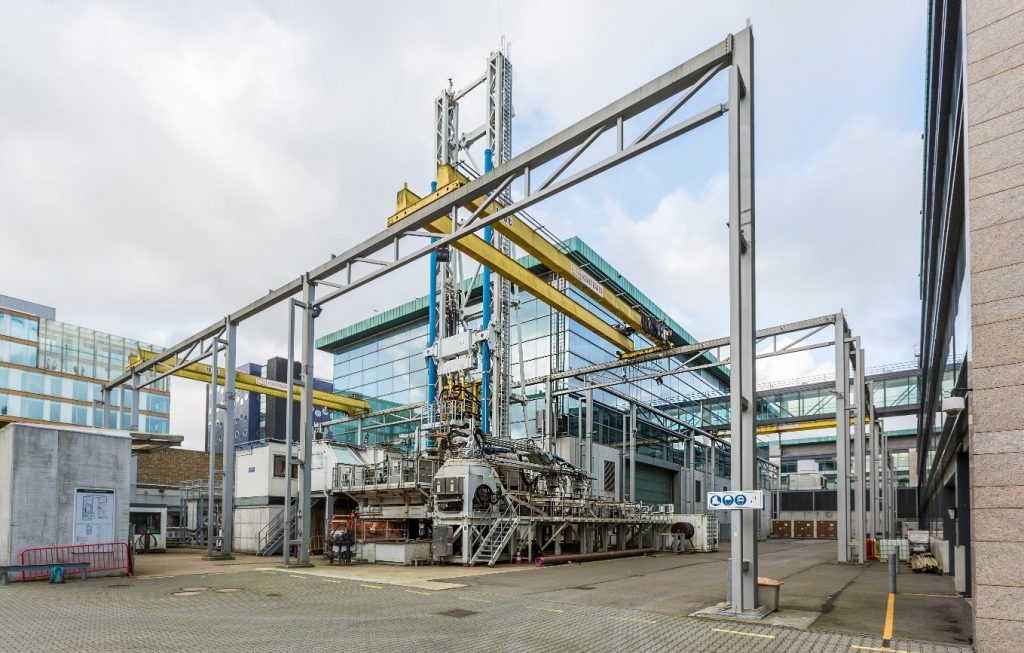New unique field laboratory for geothermal heat projects opened in Reijswijk, Netherlands

In the Netherlands, the Rijswijk Center for Sustainable Geo-energy ‘ (RCSG), a unique field lab where geothermal heat projects can be tested on a real scale has officially opened. The laboratory is to support the Netherlands work on geothermal heat in the energy transition.
The ‘Rijswijk Center for Sustainable Geo-energy ‘ (RCSG) was opened on 5 March 2020, as announced this week. The RCSG is a unique field lab where geothermal heat projects can be tested on a real scale. Geothermal heat can play an important role in the energy transition; in 2050, geothermal energy will provide a quarter of the heat demand in the Netherlands. To speed up this development, the Ministry of Economic Affairs and Climate, Energy Management of the Netherlands, Province of South Holland, Municipality of Rijswijk and TNO have set up the RCSG.
The RCSG is located in Shell’s former ‘well research and testing center’ in Rijswijk. Companies that are active in the field of geothermal heat can use the advanced laboratory. All facilities are available to test and experiment with new drilling techniques and materials under high pressure and temperature. Almost all underground conditions in the Netherlands can be simulated. Only a few comparable centers exist worldwide.
Importance of geothermal heat
The extraction of geothermal heat can play an important role in the energy transition. It is one of the important sources within the sustainable energy supply. In the Netherlands we now produce 3.5 petajoules of geothermal heat per year, but that share must grow in the future. The expectation is that by 2050 geothermal energy will produce around a quarter (200 PJ) of the total heat demand in our country. Much still needs to be done when it comes to more efficient drilling. It must become more cost-effective, with continued attention to safety. In short, many technical innovations are needed. The RCSG offers the possibility to develop and test these innovations under the conditions present in the subsurface (such as high pressure and high temperature).
Accessible to companies
The center is accessible to companies that want to experiment with (or test) new drilling techniques and materials, for geothermal heat or other sustainable applications. It provides them with access to modern facilities that they would otherwise be unable or difficult to use. The companies now do not have to invest in test facilities themselves. That is normally far too expensive, meaning that potentially beautiful inventions remain unused.
Mimic practice
The center has 20 installations that cover the entire spectrum of underground drilling. There is a large drilling rig above an almost 400 meter deep well, in which new materials and techniques can be tested. There are 300 and 400 tonne hydraulic presses, pressure vessels up to 1,000 bar and piping systems for pumping and testing liquids. Underground conditions can be realistically simulated to determine how materials and components behave at kilometers depth under high pressure or at high temperatures.
Statements by the partners about the innovation lab:
Ton de Jong, director TNO Energy Transition: “The sustainable use of the subsurface has been on TNO’s research agenda for years. This concerns the extraction of low and high temperature heat from the subsurface, the temporary storage of energy in the subsurface and the storage of CO2 during the phasing out of the fossil energy system. The RCSG makes it possible for companies and knowledge institutions in close cooperation through the development of new technology to take major steps in the transition to a sustainable energy system. ”
Jan Willem Hoogstraten, CEO of Energie Beheer Nederland (EBN): “The future of our sustainable energy supply above ground rests for an important part on the value and knowledge of our Dutch subsurface. The center helps with the development of technology that is directly applicable for the social and economic development of the Dutch subsurface. EBN wants to help accelerate the energy transition with knowledge, technology and innovation. The center can play an important role in this as well as in the development and strengthening of growth markets such as geothermal energy and the storage of CO2, hydrogen and heat.”
Sandor Gaastra, Director General at the Ministry of Economic Affairs and Climate: “Geothermal energy can make an important contribution to making our heat supply more sustainable. The geothermal industry is a relatively young sector that is developing strongly. An easily accessible opportunity to experiment with new techniques and materials offers the opportunity to significantly accelerate that development. ”
Berend Potjer, deputy energy, province of South Holland: “Half of the geothermal heat projects are carried out in South Holland because the soil in our province is very suitable for geothermal heat. From the start we have supported various pilot projects in horticulture. We have already built up a great deal of expertise in this area in our region. Now it’s time to scale up and, in addition to greenhouses, also heat up residential areas with geothermal energy. This center helps to accelerate this development.”
Armand van de Laar, Councilor of Municipality of Rijswijk: “In addition to the contribution to the energy transition, this project also provides great added value for the development of the area. This investment provides new activity and dynamics in the Plaspoelpolder. Rijswijk welcomes all visitors and customers of the new test center. Other companies that want to make an impact on a sustainable world and are looking for space for office, production or laboratory can also go to the Plaspoelpolder. Innovation and an attractive business climate go hand in hand here.”
Source: TNO